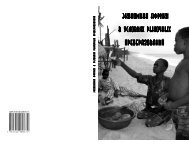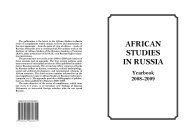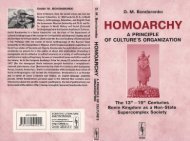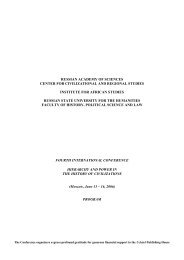L. Fituni, I. Abramova Resource Potential of Africa and Russia's ...
L. Fituni, I. Abramova Resource Potential of Africa and Russia's ...
L. Fituni, I. Abramova Resource Potential of Africa and Russia's ...
Create successful ePaper yourself
Turn your PDF publications into a flip-book with our unique Google optimized e-Paper software.
In this respect <strong>Africa</strong>n <strong>and</strong> Russian private owners <strong>of</strong> extractive<br />
industries have a lot in common. The differences usually lie in the<br />
sphere <strong>of</strong> cultural, educational or psychological background. But on<br />
the whole, the lack <strong>of</strong> interest in the consequences <strong>of</strong> continual depletion<br />
<strong>of</strong> their nations <strong>of</strong> necessary natural or financial resources is<br />
characteristic to the majority <strong>of</strong> <strong>Africa</strong>n <strong>and</strong> Russian owners <strong>of</strong> export-oriented<br />
mining enterprises. Many opinion polls show that they<br />
are more inclined to consider themselves to be World Citizens,<br />
rather than national.<br />
The third component <strong>of</strong> the Russian <strong>and</strong> <strong>Africa</strong>n natural resource<br />
bases is formed <strong>of</strong> the types <strong>of</strong> geological resources that<br />
are critical for development but are acutely in deficit. For Russia<br />
these are minerals much needed by industry: bauxites, titanium,<br />
zirconium, <strong>and</strong> chromium <strong>and</strong> manganese ore. Consumption <strong>of</strong><br />
these minerals strongly depends on their import. Their production<br />
meets only a minor part <strong>of</strong> the dem<strong>and</strong> for them. At the same<br />
time, Russia exports their derived products: aluminum, titanium<br />
<strong>and</strong> titanium sponge, <strong>and</strong> ferrochrome produced mainly from imported<br />
raw materials.<br />
<strong>Africa</strong> as a whole is in this respect more self-sufficient than Russia,<br />
but the situation changes dramatically as soon as we start analyzing<br />
the situation on the country to country basis. The requirements<br />
<strong>of</strong> individual national industries there are <strong>of</strong> course lower than<br />
in Russia. But nearly two thirds <strong>of</strong> <strong>Africa</strong>n countries are net importers<br />
<strong>of</strong> oil <strong>and</strong> petroleum products.<br />
The mineral resources <strong>of</strong> <strong>Africa</strong> have not been fully charted by<br />
prospecting. But even the data available testify to the presence <strong>of</strong><br />
great mineral deposits on the continent. Being rich in various mineral<br />
deposits, <strong>Africa</strong>, however, remains a most insignificant consumer<br />
<strong>of</strong> these raw materials. The bulk <strong>of</strong> the mineral raw materials<br />
mined in <strong>Africa</strong> are exported, satisfying one-third <strong>of</strong> the requirements<br />
<strong>of</strong> industrially advanced countries.<br />
Quite naturally, like Russia, the <strong>Africa</strong>n countries do not want<br />
to reconcile themselves with the role <strong>of</strong> a raw-material appendage<br />
<strong>of</strong> industrialized countries, a role which has been assigned them<br />
under the current global economic model. Their struggle for the<br />
91







